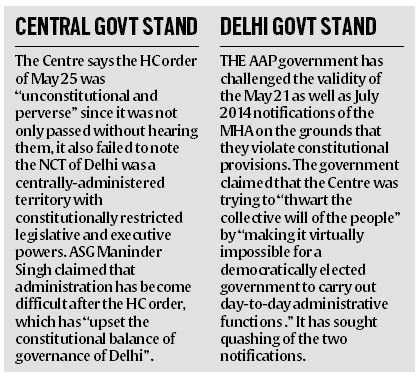Stay updated with the latest - Click here to follow us on Instagram
Kejriwal-Jung legal wrangle: SC, HC to hear row over MHA order today
The HC had said the Centre lacks executive power to issue notifications to restrict the authority of the NCT Govt of Delhi to act through ACB against Central government employees.
 The High Court had made the observation while hearing the bail application of a Delhi Police constable arrested by the ACB on bribery charges.
The High Court had made the observation while hearing the bail application of a Delhi Police constable arrested by the ACB on bribery charges.
The legal wrangle between the Centre and the Delhi government over the delegation of power is set to begin on Friday before the Supreme Court and the Delhi High Court.
The Supreme Court agreed to hear on Friday the Ministry of Home Affairs (MHA)’s appeal against the Delhi HC order that termed as “suspect” the Ministry’s May 21 notification, which states that the L-G has absolute powers over appointments and transfers of bureaucrats in Delhi. The notification also restricts the power of the Anti-Corruption Branch to probe cases again Central government employees.
On Thursday, Additional Solicitor General Maninder Singh mentioned the matter and claimed that everyday administration has become difficult after the HC order, which has “upset the delicate constitutional balance of governance of Delhi”.
[related-post]
“A state of total uncertainty prevails in the matter of governance,” the ASG told a bench of Justices A K Sikri and Uday U Lalit. When the bench said the HC has only used the word “suspect”, the ASG said a clarification was imperative as the order was passed without hearing the Centre.
The High Court had made the observation while hearing the bail application of a Delhi Police constable arrested by the ACB on bribery charges.
The HC had said the Centre lacks executive power to issue notifications to restrict the authority of the Government of National Capital Territory of Delhi to act through ACB against Central government employees.
It added the Delhi Assembly has authority to make pertinent laws and that the L-G must act on the “aid and advice of the council of ministers.

The Centre has told the bench that HC order was “unconstitutional and perverse” since it was not only passed without hearing them, it also failed to note the NCT of Delhi was a centrally-administered territory with constitutionally restricted legislative and executive powers.
Meanwhile, the AAP government moved the High Court challenging the validity of the May 21 as well as July 2014 notifications on the grounds that they violate constitutional provisions. The government claimed that the Centre was trying to “thwart the collective will of the people” by “making it impossible for a democratically elected government to carry out its day-to-day administrative functions and responsibilities.” It sought quashing of the two notifications.
The High Court also listed the matter for hearing on Friday.







